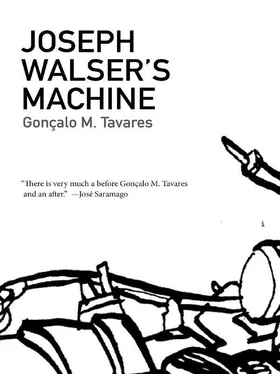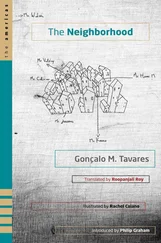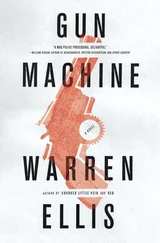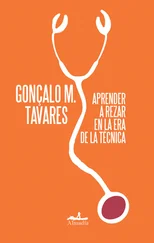His collection had become such an obsession that the moment Walser saw a piece of metal that met the required conditions, his concentration on it became unwavering; this intense concentration could be called predatory (predatory concentration, a hunter’s concentration). It was unwavering until the moment came when nobody was paying attention, which allowed Walser to grab the piece — or, rather, to steal it (this verb could certainly be used to describe the act, since that was precisely what Walser was doing).
Many — though not all — of the times someone was compelled to ask that familiar question (“Are you listening, Mr. Walser?”) he was, Walser, instead of paying attention to his interlocutor, or indeed the concrete external experience that he was sharing with this particular person at this particular time, attuned to some piece of metal and, consequently, the actions that would be necessary to obtain it. His continual lack of awareness during conversations and his often quirky behavior both certainly resulted from the same cause: his collection. Useless, absurd, and secret, it had gradually become the center of Walser’s existence. He enjoyed his wife’s company, even after it became clear that she was sleeping with Klober Muller, the foreman; he also took a certain, inexplicable physical pleasure in working at his machine, and he still liked to join his friends in the dice game they played for money, but his collection constituted the one real individual mark that Joseph Walser felt he would leave on the world. A unique mark, one that couldn’t be copied; no one else had a collection like his.
It was an “irrational” collection, more irrational than the usual sorts of collection already are, and this fact set Walser apart from other men. Joseph Walser had been educated to function with absolute rationality, to participate in the mandatory, continual evaporation of unreason that is always interfering with the lives of men. He knew very well that it was Reason that protected him, that allowed him to defend himself, even more so now that the chaos of the war, the military occupation, and the bomb attacks were becoming, more and more each day, a source of increasing and widespread danger: nothing at all was beyond the reach of the disorder that had descended upon the city.
Nevertheless, Walser had never been as obsessive about his collection as he’d grown in the last few months. The more the disorder and unpredictability of the war grew, the more time Walser spent locked away in his study taking measurements: width, length, and height, drawing the shape of a piece of metal as well as the machine or simple structure to which it belonged, jotting down its color and function — any possible concrete functions it might have had — jotting down the place where he’d found this “precious” piece of metal, and the date and time; even compiling statistics about which spots had yielded the most specimens for his collection and the days of the week that were most providential; consulting his notebook and correcting any tiny errors from the days before, grouping the objects according to different characteristics: pieces from industrial machines, pieces from domestic or personal appliances, etc., etc.
All the specimens in his collection were thus catalogued in great detail, and their measurements recorded in his black notebook — with the roman numeral XXVI on the cover — long before the pieces of metal were placed on their respective shelves, organized according to their essential functions. This world which, when viewed from the outside, might seem illogical and strange, was in fact thoroughly ordered; it was a secondary order, one that only Walser could perceive.
Thus, what Walser did on that day wasn’t at all out of the ordinary: after he put the new piece on top of his desk, his first act was to write down its measurements. After a slight hesitation, Walser slid the ruler up against the piece of metal with his right hand. He had never noticed it before, but he usually, out of instinct, laid his right index finger along the length of the ruler to hold it in place. Now, as he repeated the same movement, the fact that his index finger wasn’t in the right place became obvious. Concentrating intently, he was able to stop looking at the empty place that was left by the amputated finger and focused his eyes on his middle finger, the longest finger on his hand, which slid the ruler into place in the exact same way as his index finger once did, only now he had to slightly raise the part of the palm of his hand that led up to the empty space left by the amputatation. But his middle finger was able to perform the task that his index finger had: it slid the ruler into place and kept it straight while his other hand held the piece of metal.
He had finished measuring the piece of metal that he’d stolen from the hospital. Given that it was the first time, since the accident, that he’d taken measurements, he was satisfied: he accomplished the task relatively effectively. Holding a pen in his hand, with three fingers pushing on one side and his thumb pushing on the other, Joseph Walser — albeit with hesitant, unsteady handwriting — wrote the following under the column marked height:.5.
The world is so simple, he thought.
The city calmed down in under a week. No one had been arrested in connection with the bombing, but investigations were still underway. Around the city it was said that at any moment “the culprits will be arrested” and subsequently put before the firing squad.
Joseph Walser had returned to work. Unfortunately, given the result of the accident, he couldn’t return to his old post. The amputation of the index finger on his right hand eliminated any possibility of safely operating the machine that he had worked with for years. As such, it wasn’t a question of psychology; Walser would have liked to go back to his machine, but a solid, concrete thing stood in his way: a simple missing finger. He didn’t press the issue overmuch. Klober had said, “My dear Walser, if you had an accident while you still had five fingers on your right hand, how can you possibly want to keep working with the same machine now?”
Klober’s observation wasn’t just an expression of his indifference toward what had happened, it was chiefly the effect of a calculating mind that never rested, a rationality that seemed like it was never allowed a break. The only way we can be permanently rational is by forcing our emotions to remain steady in any and all situations .
“Like the oil inside a machine,” joked Klober, “which has to remain within certain defined areas in order to be effective!”
And then, “Four fingers on your right hand aren’t enough to tame this beast,” said Klober to Joseph on the day he returned to work.
Walser accepted these statements without animosity; Klober’s observation was sensible: the machine was difficult to operate, and in his condition he wasn’t fit for the task.
He was transferred to another part of the factory, to a building that didn’t have any machines. He was no longer involved in the direct production of materials and took over the duties of a clerk.
In less than three weeks he attained the ability to write smoothly without his index finger. He felt encouraged by this quick and easy progress.
Only once after the accident had he returned to the building where he used to work, to watch “his machine” in motion, now operated by some other man. At that moment, Walser felt something inside him that one could objectively call jealously, but apparently not the usual, irrational variety of this form of affect. No, the jealousy that Walser felt was a jealousy of efficiency, a rational jealousy.
At first it was a feeling of guilt. He was the one who had abandoned the machine; or, to put it another way: he was the one who had failed, and he was no longer capable of performing the necessary movements. He had betrayed the machine by losing a finger.
Читать дальше












